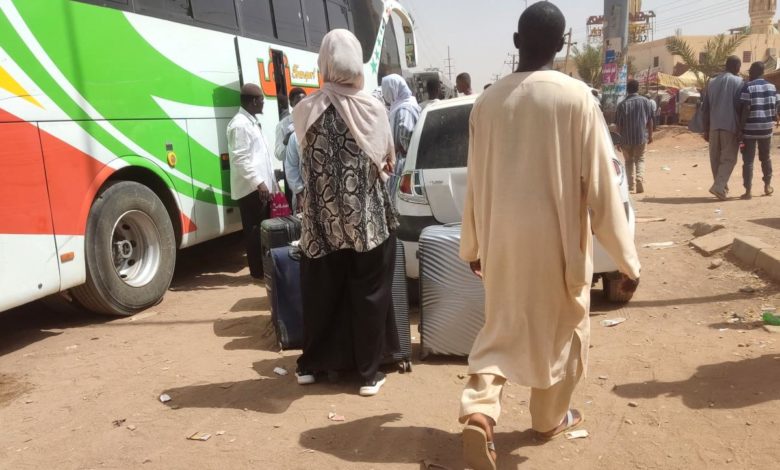(Almohagig) Examines the Facts of the Egyptian Authorities Forcibly Deporting Sudanese
Accusations, Counter-Campaigns, and Hidden Fingers to Distort Relations

Cairo – almohagig – Sabah Musa
Recently, campaigns and counter – campaigns have spread on social media sites, among Egyptians calling for the deportation of refugees and immigrants, led by Sudanese, because they cause aggravation of economic conditions and high prices, and among Sudanese who complain about the large number of arrests and being forced to return to Sudan.
Accusations of Abuse
Meanwhile, an Amnesty International report accused the Egyptian authorities of deporting Sudanese refugees to their country. In contrast, Egyptian officials, human rights activists, and parliamentarians ruled out the existence of any arbitrary measures against the Sudanese on Egyptian territory. The organization claimed that the Egyptian authorities arrested Sudanese refugees in a mass manner and were forcibly deported to Sudan, and was quoted in a report.
Yesterday, Wednesday, it said that 3,000 Sudanese were expelled from Egypt last September, and the organization considered deporting Sudanese refugees to an active conflict zone, without providing any opportunity to seek asylum, in violation of international law.
Legalization of Conditions
The Egyptian Foreign Minister, Sameh Shoukry, announced last March that Egypt had received more than half a million Sudanese since the start of the war, in addition to more than five million Sudanese living in Egypt without distinction between them and Egyptian citizens.
Last May, the Egyptian Ministry of Interior demanded Foreigners residing on its territory must go to the General Administration of Passports, Immigration and Nationality to legalize their status, renew their residency, and obtain a (smart residence card) to ensure benefit from all government services provided to them, before the end of this June, at a time when the representative of the United Nations High Commissioner for Refugees confirmed that Egypt, Hanan Hamdan, said that the number of registered refugees in Egypt has reached 640 thousand and that more than half of them are Sudanese.
Hamdan indicated in statements last week that the numbers of Sudanese and refugees in general are constantly increasing, and according to the United Nations, more than 10 million Sudanese have been displaced from their places of residence since the outbreak of fighting in the country, at a time when experts confirm that there are no clear official or governmental statistics specifying the number of Sudanese received by Egypt after the war.
But some unofficial statistics issued by several civil society organizations concerned with the refugee situation in Egypt indicate that there are more Of 10 million people, Sudanese nationality is the most numerous, followed by Syrian nationality, followed by smaller numbers from other countries.
Hidden Fingers
Amidst these accusations directed at Egypt, which is considered the largest recipient of Sudanese refugees after the war, large numbers of Sudanese families confirm that they live in peace in Egypt, that they are treated as Egyptians, and that they have not complained of any ill-treatment from the authorities or the Egyptian people.
However, the widespread campaigns against Social media indicate otherwise, and many did not rule out the presence of hidden fingers behind these allegations to distort the relationship between the two countries in favor of parties that do not want to see these relations as solid and strong. Almohagig opened the file to examine these accusations and the extent of their validity.
No Deportation
Responsible Egyptian authorities denied the existence of any arbitrary measures against the Sudanese in Egypt. Responsible Egyptian sources told the “Investigator” that Cairo does not deport, except those who have committed a crime and those who do not respect the country’s internal laws, stressing that the rights of refugees inside Egypt will not be infringed, especially since Cairo has signed On the International Convention relating to the Status of Refugees in 1951.
The sources explained that Egypt asked all foreigners, including Sudanese, on its territory to adjust their legal status to reside within the country, like any country that maintains its sovereignty, noting that Egypt provided facilities to the Sudanese who came after the internal war, including extending the periods for adjusting legal status and allowing those arriving by road. Illegal to legalize their situation.
Attempt to Offend
Commenting on the Amnesty International report, the sources accused the report of being an attempt to insult Egyptian efforts, stressing that the report contradicts reality. They indicated that Egypt receives thousands of refugees from Arab and African countries, especially those witnessing conflicts, led by the Sudanese, and they are received and treated normally. Much like their Egyptian counterparts.
Meanwhile, Egyptian economic experts who spoke to Almohagig linked Egyptian measures to legalize the status of foreigners on its territory to the increasing economic burdens of hosting them, explaining that Egypt had previously not returned illegal immigrants to their country, but with the absence of international aid for refugees and the difficult economic conditions.
Internally, it is not possible to request an increase in the number of arrivals to it in light of these increasing burdens, pointing out that Cairo is facing a crisis due to the increase in refugees on its lands and the absence of international support for it, and they stated that the total direct and indirect support that Egypt received in the last 15 months is less than 100 million dollars, stressing that this is very little support for the services provided to foreigners in Egypt, at a time when Egypt is complaining of the disproportionate international aid provided to it, with the increasing influx of refugees and migrants into its territory.
Egyptian Prime Minister Mostafa Madbouly pointed out, during his participation in the World Economic Forum in Riyadh last April, that the cost of residency for 9 million foreigners in Egypt is more than 10 billion dollars annually.
Interruption of Trips
As for the Sudanese human rights activist, Raad Ahmed Younis, for his part, he revealed that the trips that used to bring Sudanese people to Egypt through smuggling had been interrupted for about 10 days. Younis told the almohagig that the buses leaving from Cairo to Sudan and vice versa have stopped completely in recent days, adding that there were more than 18 Sudanese bus passengers who were heading from Aswan to Cairo who were detained by the Egyptian authorities and that there are intensive security measures in place.
The Kasarat area at the entrance to Aswan to prevent the entry and exit of Sudanese, stressing that the best way for the Sudanese to return from Egypt to Sudan is for them to surrender themselves to the Egyptian authorities and that they will return them easily and at a lower cost. He said that there was a Sudanese family consisting of 28 individuals who surrendered themselves to the authorities and that the authorities for its part, deported them in buses at a cost of 200 Egyptian pounds per person, and the normal trip cost no less than 7,000 Egyptian pounds.
He explained that the Egyptian Armed Forces are the ones who conduct these trips, and people see excellent treatment in them, encouraging all who wish to return to follow this method.
Egypt’s Right
Younis stated that the Egyptian authorities’ ban on smuggling trips to and from its territory came after the death of more than 50 Sudanese from thirst who came to Egypt via smuggling recently. He said that Egypt has the right as a country to prevent smuggling into its territory.
He stated that Egypt does not allow a refugee to return to a war zone, and he said that the war in Sudan is not spreading throughout the country, pointing out that there are Sudanese families who come from safe states and rent their homes in Egypt. He said that there are also families from states such as the White Nile who did not come to Egypt in the past but are coming now.
Not Visible
Regarding the rumors about the Egyptian authorities raiding the Sudanese in their homes in Egypt, he said, “I do not think this is true,” adding that these campaigns may be at the train station in Aswan, in the ambush outside Aswan on the agricultural and desert road, and at the entrance to Aswan in the Kasarat area, but they are not visible on the public street.
In any case, he continued, it is natural for the Egyptian authorities to take these measures, as they are in accordance with the law, and we cannot condemn that.
Appeal to the Authorities
The head of a Sudanese family of 11 members complained, all of them suffering from special conditions and illness. He told the almohagig that due to the treatment conditions available in Cairo, he had to take two of his family’s patients for treatment in Cairo and left the rest in Aswan, adding that now I cannot gather all my family in Cairo after the interruption of flights and the fear of arrest.
He continued, despite all of this, my work conditions required a return to Sudan, and I became My family is separated between Aswan and Cairo and my desire to return to Sudan. I appeal to the Egyptian authorities to ease procedures, especially for patients who are suffering.


